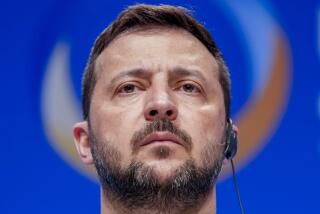THE SUMMIT AT GENEVA : Low-Budget Soviets Pinch Pennies to Purchase Western Goods
- Share via
GENEVA — Soviet leader Mikhail S. Gorbachev rode around the summit sites in a Zil limousine and stayed in a two-story stone mansion not far from Lake Geneva.
Some of his comrades who accompanied him to the summit meeting, however, stayed in much more modest quarters, riding the bus and scrimping to stretch their food allowance in one of Europe’s most expensive cities.
Even so, many managed to save some of their precious hard currency to spend in what--measured against the austere realities of life in the Soviet Union--is a veritable promised land of material goods. And whatever Marxist morality may have to say about materialism, Soviet citizens on visits to the West have voracious appetites for such things as electronic products, clothing or even throw-away cigarette lighters that are either scarce or non-existent in stores back home.
Geneva, with its cornucopia of consumer goods, had plenty of temptations even for the well-traveled Muscovites who accompanied their leader here. Solar-powered calculators, for example, are prized because it is difficult to buy good batteries in the Soviet Union.
Cassette players were highly valued by the visiting Muscovites, along with stylish watches and even a Swiss speciality, cuckoo clocks.
Scraping together the money for such items was not easy, however.
Not Much Spending Money
Traveling Soviet officials and journalists were provided 90 Swiss francs a day, or about $45, for hotel accommodations and only 50 Swiss francs a day for pocket money to cover food, transportation and other expenses.
A single room in Geneva, with virtually no frills, costs about 170 Swiss francs, or about $85 a night. A blue-plate special lunch might cost 25 francs and dinner in a good restaurant may run 120 francs or more.
“You know how much it costs for a bottle of vodka in my hotel?” exclaimed one junior Soviet diplomat. “Seventy dollars! You have got to be crazy to drink in this country.”
Top officials who stayed in first class hotels got supplements to cover their room costs, while lower-ranking aides and some Soviet correspondents had to live within their allowances.
To live out the summit on such allowances and still have money left for prized consumer goods took some doing. More than one canny Soviet official collected a daily room allowance and stayed in the Soviet Mission compound with a friend to put some hard currency aside for personal purchases.
Added to their difficulties, the Soviet journalists seemed to be under pressure to help support Moscow’s charm offensive by mixing and mingling with the vastly larger Western press corps. One Soviet journalist said that he and his colleagues worked so hard they would only have time to shop this afternoon.
“Moscow is calling us every hour,” he groaned.
About 100 Soviet officials and 50 reporters came to Geneva for the summit talks, but they felt overwhelmed by an estimated 1,200 U.S. government aides and more than 3,000 journalists from Western countries.
“Just as in military power, you are always ahead,” a Soviet correspondent told an American correspondent, faithfully echoing the Communist Party claims about U.S. attempts to achieve arms superiority.
But Soviet officials and reporters generally adopted a friendly attitude toward their traditional American rivals at Geneva, making small talk in the press center and avoiding arguments about Soviet-American differences.
It contrasted with the cold-shoulder treatment that U.S. correspondents in Moscow sometimes experience when they ask challenging questions of Soviet officials.
‘Example of Coexistence’
Julian Semonov, a writer of spy novels, came to Geneva to join what he called an advance guard of intellectuals to promote Gorbachev’s policies.
Sitting down with an American reporter in the press center cafeteria, he pronounced the summit “very useful” for the Soviet side. “This press center, for me, is an example of coexistence,” he explained. “We have different points of view, but we are comrades here.”
A few days earlier, Semonov declared in a Soviet briefing that he had gathered evidence in Afghanistan that American-backed guerrillas had chopped off the ears, the hands and the heads of innocent civilians during the fighting there.
A Swiss newspaper, the Journal de Geneve, has criticized Soviet television for deleting key words in translating an interview with Swiss President Kurt Furgler. He said he favored “peace in freedom,” but the Russian translation omitted “in freedom,” the newspaper complained.
As far as Gorbachev’s meeting with President Reagan meeting was concerned, the Soviet visitors remained cautious. “At least they’re on speaking terms,” said one Moscow correspondent. “But Reagan was showing off a little when he appeared without a topcoat to greet Gorbachev the first time.”
There was at least one hint, however, that the Soviet leader would be seeing Reagan again.
A Soviet TV cameraman noted the relatively small size of the Kremlin press corps and added:
“There will be more Soviet reporters at the next summit,” he said.
More to Read
Sign up for Essential California
The most important California stories and recommendations in your inbox every morning.
You may occasionally receive promotional content from the Los Angeles Times.










